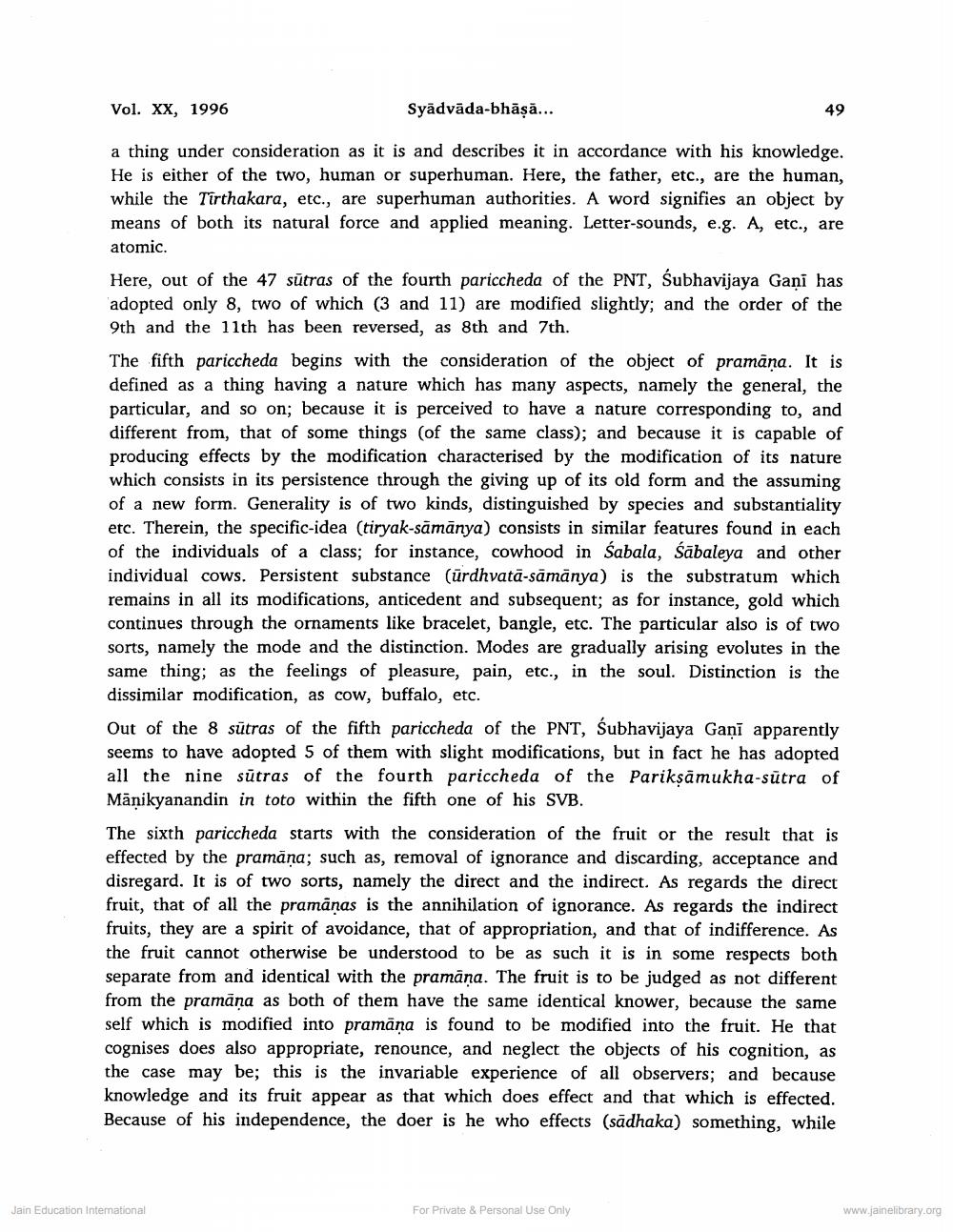________________
Vol. XX, 1996
Syadvāda-bhāṣā...
49
a thing under consideration as it is and describes it in accordance with his knowledge. He is either of the two, human or superhuman. Here, the father, etc., are the human, while the Tirthakara, etc., are superhuman authorities. A word signifies an object by means of both its natural force and applied meaning. Letter-sounds, e.g. A, etc., are atomic.
Here, out of the 47 sūtras of the fourth pariccheda of the PNT, Subhavijaya Gani has adopted only 8, two of which (3 and 11) are modified slightly; and the order of the 9th and the 11th has been reversed, as 8th and 7th.
The fifth pariccheda begins with the consideration of the object of pramāna. It is defined as a thing having a nature which has many aspects, namely the general, the particular, and so on; because it is perceived to have a nature corresponding to, and different from, that of some things of the same class); and because it is capable of producing effects by the modification characterised by the modification of its nature which consists in its persistence through the giving up of its old form and the assuming of a new form. Generality is of two kinds, distinguished by species and substantiality etc. Therein, the specific-idea (tiryak-sāmānya) consists in similar features found in each of the individuals of a class; for instance, cowhood in sabala, śābaleya and other individual cows. Persistent substance (ürdhvatā-samanya) is the substratum which remains in all its modifications, anticedent and subsequent; as for instance, gold which continues through the ornaments like bracelet, bangle, etc. The particular also is of two sorts, namely the mode and the distinction. Modes are gradually arising evolutes in the same thing; as the feelings of pleasure, pain, etc., in the soul. Distinction is the dissimilar modification, as cow, buffalo, etc. Out of the 8 sūtras of the fifth pariccheda of the PNT, Subhavijaya Gani apparently seems to have adopted 5 of them with slight modifications, but in fact he has adopted all the nine sūtras of the fourth pariccheda of the Pariksāmukha-sūtra of Mānikyanandin in toto within the fifth one of his SVB. The sixth pariccheda starts with the consideration of the fruit or the result that is effected by the pramāna; such as, removal of ignorance and discarding, acceptance and disregard. It is of two sorts, namely the direct and the indirect. As regards the direct fruit, that of all the pramanas is the annihilation of ignorance. As regards the indirect fruits, they are a spirit of avoidance, that of appropriation, and that of indifference. As the fruit cannot otherwise be understood to be as such it is in some respects both separate from and identical with the pramana. The fruit is to be judged as not different from the pramāņa as both of them have the same identical knower, because the same self which is modified into pramāna is found to be modified into the fruit. He that cognises does also appropriate, renounce, and neglect the objects of his cognition, as the case may be; this is the invariable experience of all observers; and because knowledge and its fruit appear as that which does effect and that which is effected. Because of his independence, the doer is he who effects (sādhaka) something, while
Jain Education Intemational
For Private & Personal Use Only
For Private & Personal Use Only
www.jainelibrary.org




